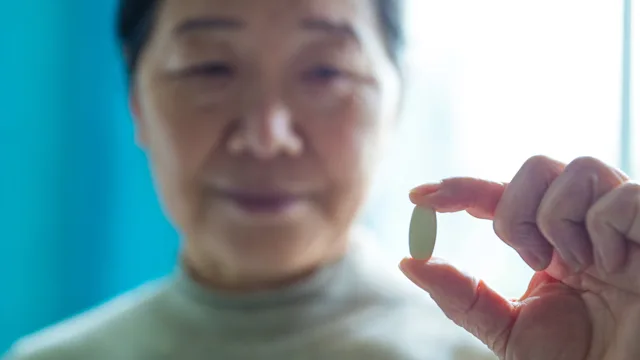Key takeaways:
Levothyroxine (Synthroid, Levoxyl, Unithroid) is a synthetic version of a thyroid hormone called T4. It’s often prescribed when the body doesn’t make enough thyroid hormone.
Those who take it say it can help with symptoms such as fatigue and brain fog.
Patients say it’s important to make dosage adjustments when needed.
Save on related medications
For Erin Kay, it was brain fog and weight gain. For Karen Scanlon, it was fatigue. For Denise Roguz, it was an array of symptoms that included depression.
All three women were eventually diagnosed with hypothyroidism, which is when the thyroid gland makes too little thyroid hormone. Your body needs thyroid hormone to help control critical functions such as your metabolism, body temperature, and heart rate.
Healthcare providers often prescribe levothyroxine — a synthetic version of the T4 thyroid hormone — to restore balanced hormone levels. It’s also known by various brand names, including Synthroid, Euthyrox, Levoxyl, Tirosint, and Unithroid.
Finding the right dosage of levothyroxine will depend on factors such as your weight and how your body responds to the medication. So it can take some adjustments to get it right.
So, what does it feel like to take levothyroxine? Here’s how Erin, Karen, and Denise describe their experiences.
It can lift ‘mind fog’
After the birth of her first daughter, Erin Kay noticed that she was losing and gaining weight, but she couldn’t figure out why. Then other problems surfaced.
“I started having a lot of mind fog,” says Erin, a 40-year-old social worker and virtual health and life coach who lives in South Carolina. She says she also started feeling fatigued.
In October of 2013, Erin was diagnosed with hypothyroidism, which is when the thyroid gland is underactive and doesn’t make the thyroid hormones that the body needs. Her doctor prescribed levothyroxine, a synthetic T4 hormone, to restore that balance.
Although levothyroxine usually takes a few weeks to kick in, Erin says she felt a huge difference within a few days.
“I felt relief in about 3 days,” she says. “It felt like I came out of the fog. I was able to go about my daily tasks.”

Erin says she soon lost weight and felt more energetic.
“I could have conversations and not forget words,” she says. “I was able to be fully present with my daughter and my husband, which is something I hadn’t been able to do.”
Every 3 to 6 months, her doctor would conduct lab tests and then adjust her dosage accordingly.
“If you have any symptoms, get your blood work checked, It could be the dose, rather than medication,” she says. “This is a medication that you kind of have to be patient with.”
She ultimately found that she also needed liothyronine (Cytomel) — a synthetic version of a different hormone, the T3 thyroid hormone.
Erin says her symptoms come back when she doesn't take her medication.
“It helps me have the energy to exercise. My clothes fit better. I’m able to do the things I want to do. And I don’t have that overhanging cloud,” Erin says.
‘Be your own thyroid advocate’
Karen Scanlon was in her mid-40s and working as a nurse in a New Hampshire school when deep fatigue began to weigh her down.
“I was extremely tired,” she says. “I would leave work and think, ‘Oh, boy. I could pull my car over and take a nap.’”
A doctor ran tests and she was diagnosed with hypothyroidism and received a prescription for levothyroxine.
She tolerated the medicine well with no side effects — and she says she felt relief immediately. It soon eased her worries that the condition might interfere with her job.
“I wasn’t tired,” she says. “I had all the great energy. Working all day was never a problem.”

Karen, who is now 64 and retired, started having symptoms reemerge in 2021. She thought it might be related to her recent switch to a generic form of the medication that was covered by her health insurance
“I was really not feeling well,” she says. “It felt almost like recovering from the flu.”
She decided to return to the brand-name medication and has since felt better.
Karen says it’s important to keep pushing to find the right dosage or mix of medications. Some people do well on levothyroxine alone, she says, while others also need the T3 hormone.
“The best thing I did was to really educate myself about the thyroid and endocrine system,” she says. “It is such an intricate system. It affects almost every system in your body.”
Karen says some people struggle for years to find a thyroid medication that makes them feel well.
“Do your research on everything. You need to be your own thyroid advocate,” she says.
Feeling better requires persistence
Denise Roguz, cofounder of the patient support site ThyroidChange, remembers having bone-crushing fatigue. But that was just the start.
“The debilitating fatigue felt like I was run over by a truck, or like a ton of bricks hit me,” she says. “There was apathy, major depression, anxiety, and panic attacks, hair loss in clumps, painful dry eyes, puffy eyes and eyelids, cold intolerance, and general lack of motivation to do anything due to the relentless fatigue.”
Denise saw a number of doctors before she was finally diagnosed with hypothyroidism in 2012 . She was later also diagnosed with Hashimoto’s disease. Denise, who is 46 and lives in Novi, Michigan, is now an advocate for thyroid patients.
She was prescribed levothyroxine but wasn’t initially tested to see if a T3 medication such as liothyronine would also help.
“Even though levothyroxine works for many people, it isn’t the answer for many thyroid patients. Many thyroid patients are poor converters of T4 to T3, and T3 is the active thyroid hormone needed by all cells in the body,” she says. “Sadly, I was one of the many ‘poor converters.’ And all the T4 in the world wasn’t helping my condition. In fact, it made my hypothyroid symptoms worse.”
After a comprehensive thyroid panel test and treatment for several underlying infections and cortisol issues, her physician put her on a combination of liothyronine and levothyroxine.

These days, Denise monitors her thyroid hormone levels carefully and gets them tested every 3 months. Her prescriptions are tweaked periodically, she says.
“Thyroid patients need individualized care and treatment for their specific needs, and doctors who understand optimal thyroid levels and treatment options. A one-size-fits-all approach to treatment doesn’t work for a lot of people,” she says.
What does a pharmacist say?

Joshua Murdock, PharmD
Pharmacy Editor
Levothyroxine is an oral medication that treats an underactive thyroid gland. It’s a lab-made version of a thyroid hormone called thyroxine (T4), and it’s a first-choice option for treating hypothyroidism. According to GoodRx data, it’s one of the top five most popular prescription medications in the U.S.
When you first start taking levothyroxine, you’ll likely start with a relatively small dose. Levothyroxine dosages range from 25 mcg to 300 mcg once daily, but your healthcare provider may bump up the amount you take by 12.5 mcg to 25 mcg every 4 to 8 weeks until you find the dosage that works best for you. A blood test called a TSH blood test will help your provider determine your dosage and make any necessary adjustments.
Although it is widely used, levothyroxine is a sensitive medication. The way your body reacts to levothyroxine is affected by many factors, such as your age, any health conditions you have, and other medications you take. Your healthcare provider will take these factors into account when deciding your dosage. Switching between brand-name and generic versions of levothyroxine can also be an issue. One type isn’t preferred over the other, but it’s important to be consistent with which one you choose to take.
It’s recommended to take levothyroxine in the morning and on an empty stomach, about 30 minutes to 1 hour before breakfast. Try to be patient when you start taking it — it often takes 4 to 6 weeks to see any big changes.
Levothyroxine is generally well-tolerated, but it still has the potential to cause side effects. Heat intolerance, sweating, and diarrhea have been reported, especially when you’re first starting the medication or changing doses. Let your healthcare provider know if you’re experiencing any side effects from levothyroxine. They may want to lower your dose.
Levothyroxine is effective for many people, but it’s not the best option for everyone. If you haven’t found success with levothyroxine, know that other choices are also available. Liothyronine (synthetic T3) is one example. Your healthcare provider can help you find the thyroid medications that are best for you.

Why trust our experts?




















